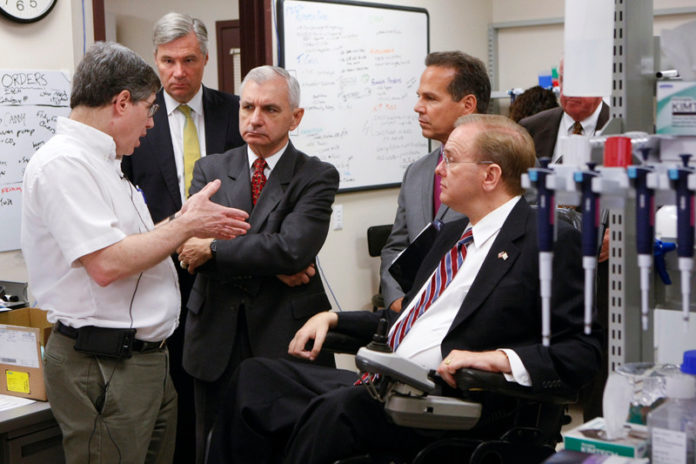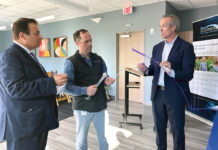
The University of Rhode Island’s Institute for Immunology and Informatics, also known as iCubed, does not rely on the university to finance its faculty salaries, and none of its faculty are tenured, meaning that expansion of any individual investigator’s program is entirely dependent on whether they publish and win grants, said director Dr. Anne S. De Groot. Faculty members who win grants get more space and equipment and control their own funding.
Dr. Alan L. Rothman is one of iCubed’s most successful researchers. He also represents an investment the university made despite budget constraints to bring him to Rhode Island that is paying off in helping raise the school’s profile as a research institution.
After more than 20 years at the University of Massachusetts Medical School, Rothman was recruited to iCubed in 2011, a move that immediately paid off with the transfer of $4 million in grant money to the University of Rhode Island. But there was much more to come.
“I saw an exciting opportunity to be part of an important and ambitious new initiative,” said Rothman. “Dr. De Groot and [URI President David M.] Dooley had a vision of developing a center of excellence in Providence conducting immunology research.”
Rothman is a leading researcher of dengue fever, a mosquito-borne viral disease common to the tropics that manifests in flu-like symptoms, including high fever and acute joint pain.
“The global burden of dengue is staggering,” said Rothman. “It is estimated that hundreds of millions of people get infected each year, though our data are incomplete. Fortunately, the number of deaths is relatively low, compared to malaria, tuberculosis and HIV, but dengue represents a major burden on the health care systems in developing countries.”
In July, Rothman received an $11.4 million grant from the National Institutes of Health in support of his research, one of the largest grants ever awarded to a University of Rhode Island researcher.
With the recent addition in September of a $9.8 million NIH Centers of Biomedical Research Excellence grant, Rothman’s combined grant award total of more than $20 million is the most ever received by a single URI researcher, according to Dooley.
URI researchers have collaborated with Brown University faculty on COBRE projects before, said Dooley, but Rothman’s grant is the first COBRE award with a URI researcher as the principal investigator.
According to Rothman, a major aim of the five-year grant is to “build a cadre of junior investigators toward independence” by providing them with funding for new research projects. As principal investigator of the grant, Rothman will advise three junior investigators in developing their own research programs.
“The tightening NIH budget has created substantial challenges for young investigators,” said Rothman. “Many are deciding that there is no future in university-based research, and leaving that career path for jobs in industry or purely teaching assignments. I don’t criticize that career choice, but once these people leave academic research, it is very hard to return. I am hardly alone in worrying about the long-term implications of these trends.”
Rothman attributes the funding squeeze in part to federal budget cuts, and worries that dwindling numbers of up-and-coming researchers – and earlier retirements among senior investigators – will cause a dangerous knowledge gap.
“In that regard, we have been very excited about the prospect of this grant, since a key part of it is to help younger people to get started,” Rothman said.
However, the broader impact of Rothman’s COBRE grant is not limited to research development, said De Groot.
The intersection of academic research and private-sector development – physically embodied in the public-private partnership between iCubed and EpiVax, the immunoinformatics company De Groot co-founded in 1998, forms a significant part of Dooley’s vision for URI. On Sept. 5, the university launched its Business Engagement Center, designed to give local businesses easy access to URI talent and resources.
“Those kinds of partnerships are very consistent with the mission of URI as a land-grant public university, to take steps to improve the economic well-being of the state in which we’re located and of the nation more broadly,” said Dooley.
Rothman’s COBRE grant funding will support this mission by drawing companies to Rhode Island that hope to engage in collaborative research efforts and develop new intellectual property, Dooley said.
“A lot of companies out there are frequently inclined to partner with research-intensive universities, so by building that capacity at URI, I think we’re more likely to attract those partnerships,” said Dooley.
The COBRE grant and its potential to bolster the Rhode Island economy are fruits harvested from URI’s investment in helping bring Rothman to iCubed. Dooley’s office contributed $210,000 in startup funds for Rothman’s lab and equipment, and the URI College of the Environment and Life Sciences provides for a significant chunk of his $227,000 salary, more than half of which is funded through Rothman’s NIH grants.
“We put the resources together at a time when resources were not necessarily easy to come by,” said Dooley. “We made an investment, and it’s certainly paid off.”
It is a formula for success that Dooley hopes to reproduce.
To do this, he said, URI must build toward cultivating a “critical mass” of top-notch faculty that rivals the brainpower of top U.S. research institutions that, until recently, most would not have associated with the University of Rhode Island.
“I think we’ve made our stage larger,” said Dooley. “For 30 years, the Graduate School of Oceanography has been the kind of place to attract world-class researchers. What’s happening is we’re growing the number of areas in which URI is taking a leadership role and becoming recognized nationally.”
Last year, the National Security Agency designated URI a Center of Academic Excellence in Information Assurance Research, and the university’s Digital Forensics and Cybersecurity Center receives federal funding to help public- and private-sector professionals protect information.
URI Provost Donald H. DeHayes pointed to the Rhode Island Consortium for Nanoscience and Nanotechnology, a joint entity between URI and Brown University, as another example of vital research by URI experts. The consortium aims to promote new technology ventures and collaborate with nanotechnology industries to energize the local economy.
“The university has a wealth of expertise that can be deployed to solve everyday problems out in the business world, and to uncover opportunities,” said DeHayes.
Going forward, Dooley also hopes to expand research opportunities in social sciences and the arts, while continuing to recruit both young faculty and high-profile researchers like Rothman.
“Every single one we attract makes it likely that we’ll be able to attract more and build a concentration of dedicated people,” said Dooley. “And that’s been the secret of success for a long time.” •












